Transcript #6: Kind Hearts and Coronets
A classic comedy of manners and murder
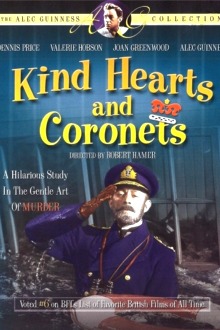
Kind Hearts and Coronets, Noblesse Oblige, Adel verpflichtet, Sangue blu, 8 Vidas Por um Título, Добрые сердца и короны, As Oito Vítimas, Sju hertigar, 仁心与冠冕
This classic "black comedy" was produced by Michael Balcon.
It stars Alec Guinness as the Duke of Chalfont - and seven other members of the D’Ascoyne family; Dennis Price as the murderous relative; and Joan Greenwood as the charming but amoral Sibella.
Levels: Upper Intermediate to Mastery (B2 to C2)
Welcome to the transcript!
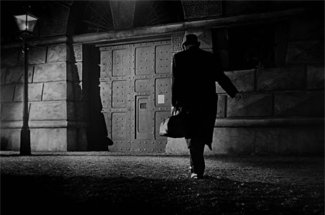
SCENE - THE PUBLIC HANGMAN ARRIVES AT A LONDON PRISON.
A NOTICE ON THE GATE, DATED 1908, SAYS THAT LOUIS D’ASCOYNE MAZZINI, DUKE OF CHALFONT, HAS BEEN CONVICTED OF MURDER AND WILL BE PUT TO DEATH AT 8 O’CLOCK THE NEXT MORNING.
WARDER. Evening, Mr Elliott.
HANGMAN. Good evening. Brrr.
WARDER. Just sign the book, if you will.
HANGMAN. Yes.
WARDER. Been keeping you busy, Mr Elliott?
HANGMAN. Oh, just nicely. Went up to Manchester on Monday, a poisoner. Baby-farmer at Holloway this morning. Very ordinary crimes, both of them.
WARDER. This one we've got for you tomorrow is something special.
HANGMAN. Yes, very much so. Even after all my years in the profession, I'm quite looking forward to him. Well, I must be getting along.
WARDER. Good night, Mr Elliott.
HANGMAN. Good night.
WARDER. Usual cup of tea at 7:00?
HANGMAN. Oh, please.
SCENE - INSIDE THE PRISON
HANGMAN. Even my lamented master, the great Mr Berry himself ... never had the privilege of hanging a duke.
GOVERNOR. Hm.
HANGMAN. What a finale to a lifetime in the public service.
GOVERNOR. "Finale"?
HANGMAN. Yes, I intend to retire. After using the silken rope ... never again be content with hemp.
GOVERNOR. Quite. Well, here we are
HANGMAN. Oh, thank you. How will he approach it?
GOVERNOR. I should think as the calmest you've ever known.
HANGMAN. Noblesse oblige, doubtless. A difficult client can make things most distressing. Some of them tend to be very hysterical. So inconsiderate. Well, Colonel, considering the importance of the occasion I shall retire early. The last execution of a duke in this country was really badly bungled. That was in the old days of the axe, of course.
GOVERNOR. Yes.
HANGMAN. Oh, I almost forgot. Um, you must forgive my ignorance, but when we meet in the morning ... what is the correct form of address? Your Lordship?
GOVERNOR. Your Grace.
HANGMAN. Your Grace? Oh. Thank you. Good morning, Your Grace. Good morning, Your Grace.
SCENE - INSIDE LOUIS MAZZINI’S CELL
GOVERNOR (TO WARDERS). All right, sit down.
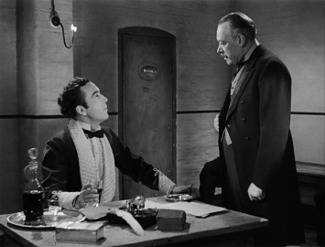
WARDER. Good evening, Your Grace. Er, thank you, no. I, er, I called to inquire whether you had any special wishes for breakfast.
LOUIS. Just coffee and a slice of toast, thank you. Oh, and perhaps a few grapes. I hate to disappoint the newspaper-reading public, but it'll be too early for the conventional hearty breakfast. The appointment is at 8:00, is it not?
GOVERNOR. At 8:00, er, yes. If I may venture to say so, I am amazed at your calmness.
LOUIS. Dr Johnson was, as always, right ... when he observed, "Depend upon it, sir. When a man knows that he's going to be hanged in a few hours ... it concentrates his mind wonderfully."
GOVERNOR. Yes. Well, if there is nothing further I can do for you -
LOUIS. Nothing. Thank you, Colonel. We shall have the opportunity of making our adieus in the morning, I presume.
GOVERNOR. I regret to say, yes. Good night, Your Grace.
LOUIS. Good night, Colonel. [LOUIS READS] "A brief history of the events leading thereto written on the eve of his execution by Louis d'Ascoyne Mazzini, 19th Duke of Chalfont, who ventures to hope that it may prove not uninteresting to those who remain to read it. " [THE WARDER STARTS TO SNORE]
LOUIS. My good man, it is not by my choice that you keep me company. If you wish to sleep, pray do me the courtesy of sleeping quietly. "With so little time remaining to complete my story it is difficult to choose where to begin it. Perhaps I should begin at the beginning. I was a healthy baby, born of an English mother and Italian father, who succumbed to a heart attack at the moment of first setting eyes on me. In the circumstances, it will be understood that I have but slight memory of him. The little I know comes from what Mama told me."
MAMA. Your father was a very handsome man.
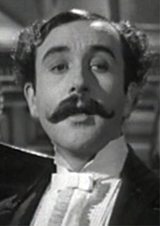
LOUIS’ FATHER SINGS AN ARIA FROM MOZART’S DON GIOVANNI:
"E del bel ciglio il pianto Cercate di asciugar"
Mama was the daughter of the 7th Duke of Chalfont, of Chalfont Castle. She eloped with her handsome singer, and exchanged the medieval splendours for the modern conveniences of number 73 Balaclava Avenue, SW. They were poor, but they had five happy and harmonious years before my arrival sent Papa off to join the heavenly choir. Reduced to even deeper poverty by my father's death, Mama swallowed her pride and made an effort at reconciliation with her family. They did not even reply to her letter. In order to keep us both alive, she was reduced to the horrible expedient of taking in a lodger. For him, she had to perform the most menial tasks.
She felt that her family had conspired to cheat me of my birthright, and I passed from infancy to childhood in an atmosphere of family history and genealogies.
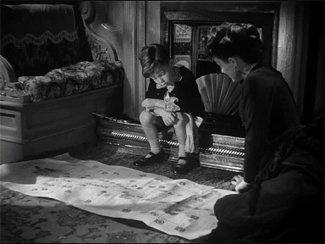
The dukedom had been bestowed by Charles II on Colonel Henry d'Ascoyne for services rendered to His Majesty during his exile. Later, for services rendered to His Majesty after his restoration, by the duchess, the title was granted the unique privilege of descending by the female as well as the male line. It was therefore theoretically possible that via Mama I might inherit the dukedom.
Mama scraped and saved and sent me to the best school she could afford. One little incident of my school days occurs to me as amusing in relation to my present situation.
TEACHER. Lionel Holland, what is the Sixth Commandment? Come, come now. Someone else then.
LOUIS. I know, please, Miss Waterman.
TEACHER. Louis Mazzini. Tell him.
LOUIS. "Thou shalt not kill. "
TEACHER. Quite right, Louis. The Sixth Commandment is "Thou shalt not kill".
No, in those days I never had any trouble with the Sixth Commandment. As to the Seventh, I was hardly of an age to concern myself with it. Although I was old enough to be in love. So Sibella enters my story. Sibella and her brother, Graham, were my only close friends and we grew up together. In their case, Mama relaxed her objection to my associating with the local children. At least their father, Dr Hallward, was a professional man.
MAMA. Louis, we must think very carefully about your future.
LOUIS. Well, it should be quite easy to get a job.
MAMA. Not a job, dear. A career. I had hoped for Cambridge for you. The d'Ascoynes always go to Trinity. And then, perhaps, the diplomatic. But I'm afraid it's no use looking as high as that. However, when you've passed your examination that should equip you for a start in one of the professions. People of quite good family go into the professions nowadays, I understand. Now, who do we know who could help us?
LOUIS. We don't really know anyone, except the family, and they don't know us.
MAMA. The least we can do is try once more. I shall write to Lord Ascoyne d'Ascoyne. He can surely do something in that bank of his.
LOUIS. Bank, Mama? Is that a profession?
MAMA. This is a private bank, Louis, dear. They don't pass money over the counter.
The letter was duly dispatched and this time we did get an answer.
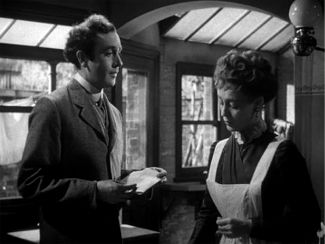
LOUIS. "Madam, I am instructed by Lord Ascoyne d'Ascoyne to inform you that he is not aware of your son's existence as a member of the d'Ascoyne family." Signed by his secretary.
MAMA. It's very stupid of him, of them all, not to admit your existence when one day you might be Duke of Chalfont.
LOUIS. It's a very big "might," Mama. There must be at least 12 people before me to say nothing of the ones who haven't been born yet.
MAMA. Stranger things have happened. I don't wish to be unChristian, but in view of their attitude, I could almost wish those twelve people should all die tomorrow.
LOUIS. All except one, Mama. Because you must be Duchess of Chalfont before I am Duke. It will have to be a job, not a career, after all, Mama.
MAMA. I'm afraid so, Louis. A d'Ascoyne in trade.
Did poor Mama's silly dreaming plant in my brain some seed which was afterwards to grow into the most sensational criminal endeavour of the century? If so, I was not conscious of it at the time for there were things of more immediate concern.
Even potential dukes have to eat. Mr Perkins, our lodger for nearly 15 years did his best to be helpful. He was employed as shopwalker in a local drapery store and found employment for me there. I became what was known as a general assistant at the drapery. This humiliation continued for two dispiriting years.
And then one day, Mama, who had broken her glasses and could not afford to have them mended, was knocked down by a tram near Clapham Junction and fatally injured.
MAMA. Louis.
LOUIS. Yes, Mama.
MAMA. I should like to be buried at Chalfont, in the family vault.
LOUIS. Yes, Mama.
I wrote to the duke informing him of Mama's dying wish. is reply was the curtest possible refusal. Standing by Mama's poor little grave in that hideous suburban cemetery I made an oath that I would revenge the wrongs her family had done her. It was no more than a piece of youthful bravado, but it was one of those acorns from which great oaks are destined to grow. Even then I went so far as to examine the family tree and prune it to just the living members. But what could I do to hurt them? What could I take from them, except, perhaps, their lives?
I indulged for a moment in a fantasy of all twelve of them being wiped out simultaneously at a family reunion by my unseen hand; of the penniless boy from Clapham being miraculously transplanted to his birthright. I even speculated as to how I might contrive it.
But there were other more urgent problems. Mama's tiny income came from an annuity and had died with her. The problem of how to live on 25 shillings a week was solved for me by an invitation from Dr Hallward to lodge with them.
It was galling to accept the status of a poor relation, but the certainty of seeing Sibella every day was too tempting to be refused.
SIBELLA. Louis, I'm so glad you accepted. It was my idea, you know.
LOUIS. I've brought you something.
SIBELLA. Oh, Louis, you shouldn't have. You can't possibly afford it. Oh, what a bother. There's Lionel. See you at supper.
The next few years brought many such heartbreaks, but they also brought promotion:
Laces and ribbons at 30 shillings a week
Fabrics at 32/6d.
Finally, ladies’ underwear at 35/-
I decided that if I was to be a draper at least I would not be a suburban draper, so I migrated to a large modern store which had just been opened in the West End, at the gigantic salary of two pounds a week. Every lunchtime I went to see how my inheritance was proceeding. Sometimes the deaths column brought good news. Sometimes the births column brought bad. The advent of twin sons to the duke was a terrible blow. Fortunately, an epidemic of diphtheria restored the status quo almost immediately and even brought me a bonus in the shape of the duchess.
That summer the Hallwards gave a party.
LOUIS. Good evening, Sibella.
SIBELLA. Hello, Louis.
LOUIS. You do look nice.
SIBELLA. So do you. Doesn't he, Lionel?
LIONEL. Very.
Emboldened by her kindness to me I made a decision I'd been toying with for some time.
SIBELLA. Well, that's the last of them, thank heaven. What an evening.
LOUIS. I thought it was a very nice evening.
SIBELLA. It may have been for you. Oh, it's awful being a woman, having to dance with a lot of dull men, laugh at their jokes while they're treading on your feet.
LOUIS. I didn't tread on your feet.
SIBELLA. You're not dull. And your jokes are funny.
LOUIS. Thank you. Sibella?
SIBELLA. Mm-hm?
LOUIS. Sibella, will you marry me?
SIBELLA. Louis, of course not. Do get up. You may be half Italian, but even so you do look silly playing the stage lover like that.
LOUIS. Oh, I look silly, do I?
SIBELLA. Yes. Very.
LOUIS [HE KISSES HER]. Do I still look silly? [THEY KISS] Now, will you marry me?
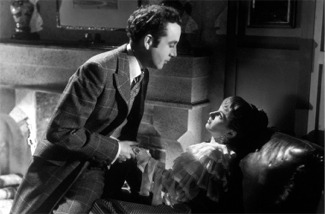
LOUIS. Why not?
SIBELLA. Because I just said I'd marry Lionel.
LOUIS. You can't.
SIBELLA. Why not?
LOUIS. Well, he's a clod. He's not a gentleman.
SIBELLA. Listen to who's talking. Whoever heard of a gentleman blacking the lodger's boots?
LOUIS. That's a wicked thing to say. Just because Mama was poor.
SIBELLA. Lionel will be very rich one day.
LOUIS. I might be a duke one day.
SIBELLA. Pigs might fly.
LOUIS. No, I might. Really, I might. You see, Mama was the daughter ...
SIBELLA. Oh, yes. I know. Well, when you are a duke you just come and show me your crown, or whatever it's called, and then I'll feel awfully silly, won't I?
LOUIS. Yes, you will.
SIBELLA. Anyhow, I'm going to marry Lionel, and now I'm going to bed.
LOUIS. You will.
If there was a precise moment at which my insubstantial dreaming took on solid purpose, that was it. The d'Ascoynes had not only wronged my mother, they were the obstacle between me and all that I wanted.
The more I thought of them, these people whom I had studied until I knew their names and histories as well as I knew my own, the more they became monsters of arrogance and cruelty, whose only function in the world was to deprive me of my birthright.
I had seen Chalfont only as Mama had painted it. To pass in through that magnificent gateway on visitor's day at a cost of sixpence was a humiliating experience but I forced myself to undergo it. I wanted a closer view of the target at which I had determined to aim. I little expected to catch a glimpse of the bull's-eye.
GUIDE. Excuse me, sir.
There were then some eight people between me and the dukedom, all seemingly equally out of reach. It is so difficult to make a neat job of killing people with whom one is not on friendly terms. I was almost resigned to its being an impossibility, when one afternoon, at a moment when my thoughts were furthest from the subject, fate took a hand.
ASCOYNE. If you've nothing better, those will have to do. These London shops are so far behind Paris. Parcel them up quickly, and we'll take them with us. Charge them to my account.
LOUIS. Yes, sir. What is the name?
ASCOYNE. Mr Ascoyne d'Ascoyne.
At last, I was face to face with one of them. This was the son of Lord Ascoyne d'Ascoyne, the banker, whose refusal to help me towards a more dignified career had led to my present ignominious occupation. What right had this arrogant puppy to be standing on the other side of the counter ordering me about? In my excitement and anger, I listened openly to their conversation.
ASCOYNE. I've booked rooms at Cruickshanks' at Maidenhead. We'll go down late on Friday afternoon.
GIRL. Are you sure it's safe?
ASCOYNE. It's the most discreet place. In fact, anonymous. Hey, you. Get on with that parcel, and never mind what we're talking about.
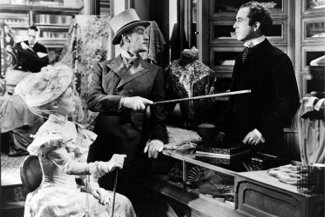
ASCOYNE. If you want to add impertinence to your eavesdropping, we'll soon see about that.
The upshot was that I was dismissed on the spot. I decided to repay him in kind, by dismissing him with equal suddenness from this world. His conversation had told me where I could probably find the opportunity to kill him. Dr Hallward's dispensary had provided me with a means. With the week's wages I had received in lieu of notice, I invested in suitable apparel for a weekend at Maidenhead.
SCENE - CRUICKSHANKS’ HOTEL, MAIDENHEAD
It was possible they might remember me, but I thought it unlikely, shop assistants being commonly regarded as an inferior race who never emerged from the other side of the counter. I decided to take the bull by the horns.
LOUIS. Forgive me. I wonder if you could oblige me with a match.
ASCOYNE. Certainly.
LOUIS. Thank you. Haven't we met before somewhere?
ASCOYNE. I don't think so.
LOUIS. Funny, 'cause I could have sworn I knew your face. Were you at Monte last year?
ASCOYNE. The year before.
LOUIS. Ah, that must be it. Won't you join me?
ASCOYNE. Thank you. Not this evening. We are rather tired.
I deprecated their retiring so early but it was hard to blame them for weekends, like life, are short. The next morning, I waited for them to come down, and the next afternoon. They didn't appear the whole day. Nor the morning after. I no longer felt sentimental. The weekend was nearly over, and I could hardly expect providence to offer me so promising a chance again.
SCENE - THEY GO BOATING ON THE RIVER THAMES
I was in a state of desperation and I followed them, hoping for I knew not what. I had the poison with me, but they hadn't even taken a picnic basket. It was possible, however, that they might stop somewhere for refreshment.
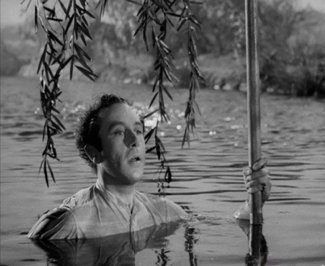
They did stop shortly afterwards, but not for that. Judging by past experience, they would be there for hours. [THE COUPLE ARE KISSING IN A SMALL BOAT. LOUIS SEES A WARNING SIGN ABOUT THE DANGEROUS WEIR, A HAZARD EVERY DAY FROM 2PM. LOUIS TAKES OFF HIS CLOTHES AND SWIMS] The rest followed automatically.
I had fortunately learned to swim at the Clapham Municipal Baths though I never had occasion to try it underwater. I had no wish to surface under their noses though I doubt if they would have noticed me even if I had. It was beautifully timed. [HE UNTIES D’ASCOYNE’S BOAT] I was sorry about the girl but found some relief in the reflection that she had presumably, during the weekend already undergone “a fate worse than death”.
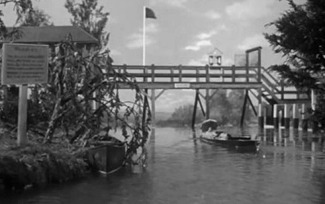
I decided to defer consideration of where and how I should next strike until my nerves were thoroughly restored. It must be remembered that I was very young and, furthermore, I am not naturally callous.
I suddenly conceived a brilliant idea. I would write a carefully phrased letter of condolence to old Ascoyne d'Ascoyne. There would be an agreeable feeling of revenge for his cruelty to Mama. And, further, it had not failed to occur to me that there was, at the moment, a vacancy in the banking house. Ascoyne d'Ascoyne duly rose to the bait.
ASCOYNE. Please be seated, Mr Mazzini. How do you do? My late son.
LOUIS. A great loss.
ASCOYNE. He was young and foolish but I believe had he been spared
until his maturity ...
LOUIS. It was my consciousness of that which led me to presume to tender you my sympathy.
ASCOYNE. I am glad that you did so. A loss so tragic serves to put lesser matters in their proper perspective. If I remember rightly, Mr Mazzini, some years ago I received a communication from your mother.
LOUIS. My late mother.
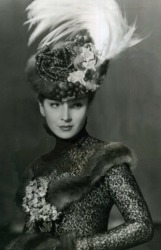
SIBELLA. Hello, Louis. You look very pleased with yourself.
LOUIS. So do you.
SIBELLA. I have news.
LOUIS. So have I.
SIBELLA. What is it?
LOUIS. No, yours first.
SIBELLA. Lionel and I have fixed a date for our wedding, in two months' time.
LOUIS. My congratulations. No, I should congratulate him. I compliment you.
SIBELLA. Now yours.
LOUIS. Nothing as exciting as yours. I went today to see Lord Ascoyne d'Ascoyne, my cousin, you know. He has a private banking house in the city. He offered me employment at once at five pounds a week, with excellent prospects for promotion.
SIBELLA. Louis, I'm so glad for you. Louis, do you remember?
LOUIS. What?
SIBELLA. Once, in this room, after my party ...
LOUIS. I kissed you.
SIBELLA. Yes.
LOUIS. And you were horrible to me.
SIBELLA. Yes. I made fun about you being related to the d'Ascoynes. I'm sorry.
LOUIS. You take it more seriously now?
SIBELLA. Yes. Louis, kiss me, to show you've forgiven me.
LOUIS. No, it would be wrong. You're pledged to Lionel. I behaved like a cad that night.
SIBELLA. I like you when you behave like a cad.
LOUIS. You're a person who must dance through life, Sibella, and I hope Lionel won't tread on your feet too often.
My new employment was humble enough but I had to test the rungs of the ladder before I could climb it. The next candidate for removal seemed to be young Henry d'Ascoyne. 24 years old, recently married, as yet without issue. I had quite an accumulation by now of d'Ascoyne data culled from newspapers and periodicals, and I looked through it for a possible approach to Henry.
I found one. I bought the necessary equipment, secondhand, and bicycled down the following weekend. I had studied a couple of photographic manuals during the week and found that, in practice, the mysteries of the camera demanded little more than ordinary intelligence, plus the ability to judge the subject upside-down. It was thus, indeed, that I first saw Henry d'Ascoyne. My method of approach proved an instantaneous success.
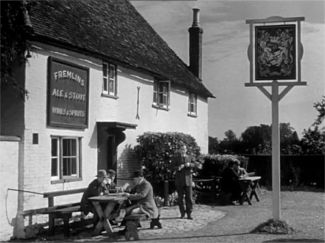
HENRY. Excuse me. Isn't that a Thornton Pickard?
LOUIS. Yes. Are you a photographer?
HENRY. Dabble in it. Got a Sanger Shepherd.
LOUIS. A Sanger Shepherd?
HENRY. Nice little camera. Focal plane shutter, rapid rectilinear and all that. Look here. Why not come up to my house, and I'll show it to you?
LOUIS. Well, I'd be most interested.
HENRY. My name's d'Ascoyne, by the way.
LOUIS. Mine is Mazzini.
He seemed a very pleasant fellow, and I regretted that our acquaintanceship must be so short.
HENRY. Had one of the potting sheds fixed up as a darkroom. Couldn't have suited better if it had been built for it. Had the equipment sent down from town. And I must say the results have been absolutely top-hole. I'll show you some quarter-plates I've taken about the village. There we are. Absolutely lightproof, except for this. Everything to hand : developing dishes here, toning bath here, whole-plate enlarger.
LOUIS. Perfect.
HENRY. Not too bad, is it? Talking of the village, by the by, I don't know if you're thinking of sending any of your efforts here to some periodical, but there's just one thing. I'm sure you're a good fellow, or I wouldn't like to ask.
LOUIS. Ask what?
HENRY. I'd be most grateful if you'd keep back that last plate you exposed.
LOUIS. The inn? But it was delightful.
HENRY. Yes. The fact is, my wife has views about such places so I never go in them, you understand?
LOUIS. Naturally, I wouldn't dream of embarrassing you.
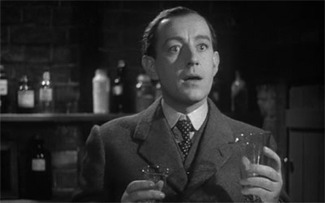
LOUIS. None.
HENRY. Splendid. What shall it be? Sherry? Whisky?
LOUIS. I think a small developer.
The mental picture of his wife that I had formed from Henry's words left me unprepared for the charm of the woman I was to meet. She was as tall and slender as a lily and as beautiful.
HENRY. My dear, this is Mr Mazzini. He has a Thornton Pickard. Mr Mazzini, my wife.
EDITH. I'm no photographer myself, Mr Mazzini, but I share my husband's pleasure in welcoming a fellow enthusiast. You'll take some sherry?
LOUIS. Well, thank you, I ...
EDITH. My husband and I never touch alcohol, but we see no reason, on that account, to enforce our views on our guests. Glass of sherry, Harwood.
HENRY. I have some printing frames out in the sun. If you don't mind, I'll just run out and see to them.
EDITH. Have you been in the neighbourhood long, Mr Mazzini?
LOUIS. A few hours only. I was cycling through the village and felt compelled to stop and make a study or two of the inn. It looked so charming.
EDITH. It does look charming. But I'm afraid it's by no means an influence for good in the lives of our people here. The landlord is a former coachman of ours. I have spoken to him several times about the amount of drinking that goes on there, but he continues to allow it.
LOUIS. It is, after all, I suppose, his livelihood.
EDITH. I do not consider he has the right to make a livelihood by exploiting the weaknesses of his fellow men.
LOUIS. Put as you put it, it does sound deplorable.
EDITH. It is deplorable. Will you excuse me a moment? Harwood ...
I could well understand Henry's visits to the village inn and his stock of refreshments in the darkroom. Mrs d'Ascoyne was beautiful, but what a prig she was. I wondered how to ingratiate myself with her and decided to attack on her own ground and with her own weapons.
EDITH. I'm afraid we can offer you only a simple luncheon, Mr Mazzini.
LOUIS. You are most kind, but I feel I should not intrude.
EDITH. It is no intrusion.
LOUIS. I'm afraid it is. May I explain?
EDITH. Please do.
LOUIS. It was only when your husband told me his name that I realised that I'd come by chance into the most embarrassing situation. My mother was a member of the d'Ascoyne family. She married, as they thought, beneath her. And from that day, they refused to recognise her or my existence. I feel therefore that, although in the circumstances you might hesitate to say so to my face, you and your husband would prefer not to receive me at your table. Perhaps you would be good enough to explain matters to your husband for me. I shall, naturally, leave the neighbourhood at once.
EDITH. Mr Mazzini, please sit down.
LOUIS. Oh.
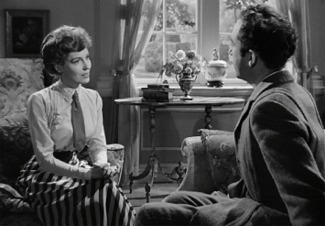
LOUIS. Oh, in that case, I shall be delighted and honoured.
My impersonation of a man of sterling character was such a resounding success that Mrs d'Ascoyne invited me to spend the following Saturday-to-Monday with them. When I returned to the somewhat contrasting atmosphere of Clapham, I found the house in a whirl with preparation for Sibella's wedding to Lionel which was to take place next day.
Before going to bed that evening, I wandered into the old nursery to fetch a book I'd left there.
LOUIS. Penny for them.
SIBELLA. Oh, hello, Louis.
LOUIS. You're not looking as radiantly happy as young females in your situation are supposed to look.
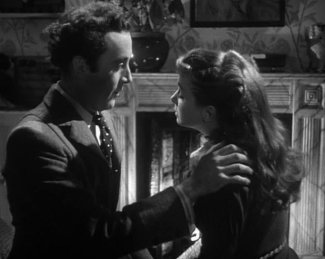
LOUIS. And Lionel.
SIBELLA. Yes, and Lionel. Oh, Louis, I don't want to marry Lionel!
LOUIS. Why not?
SIBELLA. He's so dull!
LOUIS. I must admit he exhibits the most extraordinary capacity for middle age that I've ever encountered in a young man of 24. However, it's a bit late in the day to think of that, isn't it?
SIBELLA. I know. That only makes it worse.
LOUIS. I always told you you should marry me.
SIBELLA. I know. That makes it worse too. [THEY KISS]
SCENE - AT THE WEDDING
LOUIS [TO SIBELLA] You look more lovely today than I've ever seen you.
LOUIS [TO LIONEL] You're a lucky man, Lionel. Take my word for it.
I could not help feeling that even Sibella's capacity for lying was going to be taxed to the utmost. Time had brought me revenge on Lionel. And as the Italian proverb says: "Revenge is a dish which people of taste prefer to eat cold".
The following Saturday I left London in the middle of the night and reached Henry's house just before dawn. It took a mere three minutes to substitute petrol for the paraffin in the darkroom lamp. And I then repaired to a meadow and took a few hours’ sleep while awaiting the hour at which I could reasonably arrive at the house. The day dragged by in an agony of suspense for me. Henry took photograph after photograph but seemed to have no urge whatever to follow it up with a visit to the darkroom.
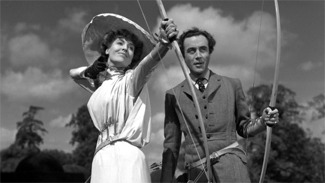
HENRY. Bravo, Edith!
I began to fear that he had suddenly taken the Pledge.
HENRY. I think I'll just go and develop these before tea. Care to come?
LOUIS. I would, indeed, but I have a slight headache the sun, I think, and I'm afraid the chemicals wouldn't improve it.
EDITH. Mr Mazzini and I will have tea under the tulip tree. I've always found that most beneficial for a headache.
LOUIS. I'm afraid Henry will think me a poor enthusiast.
EDITH. I sometimes think that he is too great a one. In a way, I am to blame for it. Before we were married, he had few interests. He used to spend the greater part of each day at his club. [DISTANT EXPLOSION] I felt that such a life was unhealthy and persuaded him to live here in the country. I hoped that perhaps he would interest himself in the welfare of our tenantry, as I do. But he became interested in photography on our honeymoon, and since then it has become the major preoccupation of his life. [A COLUMN OF SMOKE RISES AT THE END OF THE GARDEN] Mr Mazzini.
LOUIS. Yes.
EDITH. I hope you will forgive my speaking to you on a personal matter but it worries me that Henry should spend so much time on his hobby that he has little left for any more useful activity. Am I right to let him go on like this?
I could hardly point out that Henry now had no time left for any kind of activity, so I continued to discuss his future.
LOUIS. He has never shown any wish for a career in politics?
EDITH. None.
LOUIS. Nor any other ambitions?
EDITH. One only: to win a prize at the Salon Photography in Brussels. What is it?
LOUIS. They're just burning some leaves at the bottom of the garden.
EDITH. But they can't be at this time of year. [SHE TURNS AND SEES THE SMOKE] Henry!
LOUIS. No. You stay here.
Needless to say, I was too late. The funeral service was held in the village church at Chalfont, prior to interment in the family vault. Mrs d'Ascoyne, who had discerned in me a man of delicate sensibility and high purpose, asked me to accompany her on the cross-country journey.
THE REVD HENRY D'ASCOYNE. "To everything there is a season, and a time to every purpose under the heavens. A time to be born, and a time to die".
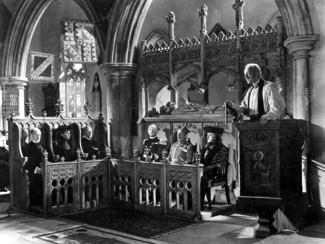
The occasion was interesting in that it provided me with my first sight of the d'Ascoynes en masse. Interesting and somewhat depressing, for it emphasized how far I had yet to travel. There was the duke. There was my employer, Lord Ascoyne d'Ascoyne. There was Admiral Lord Horatio d'Ascoyne. There was General Lord Rufus d'Ascoyne. There was Lady Agatha d'Ascoyne. And in the pulpit, talking interminable nonsense, the Reverend Lord Henry d'Ascoyne:
HENRY. The life cut short was one rich in achievement and promise of service to humanity.
The d'Ascoynes certainly appeared to have accorded with the tradition of the landed gentry and sent the fool of the family into the Church.
ETHELRED. Well, good-bye, my dear.
EDITH. Good-bye.
ETHELRED. No fretting now. After all, one thing to be said, we all have to come to it.
Great thing, you know, family vault like ours. Constant reminder of one's heritage. Now, take this new cremation nonsense. Who wants to see his nearest and dearest put in an incinerator?
LOUIS. I think, sir, Mrs d'Ascoyne should leave. The wind is turning cold.
ETHELRED. As Mrs d'Ascoyne thinks best. Glad we had cousin Henry to take the service. Boring old ass, but it keeps the thing in the family. People getting strange ideas these days. Had a fellow write to me not so long ago wanted to bury his mother here, from Tooting or somewhere. Start letting strangers in, the place will be full up. No room for us, eh?
I privately promised him that I would make it my business to see there was room for him.
EDITH. Uncle Ethelred is not the most tactful of men.
LOUIS. I could gladly have struck him.
EDITH. Thank you for intervening when you did. The house will be so empty, and yet he will be in it everywhere. I find the thought of life there hard to face.
LOUIS. Must you stay there? A new environment ...
EDITH. I must ... for one reason if no other. They would say I was running away, that there was truth in all these rumours.
LOUIS. Rumours?
EDITH. In the village. There's been gossip. They say that Henry drank in secret. They even say that that was the cause of the accident.
LOUIS. I'm sure that Henry would never have professed one thing and practised another.
EDITH. I, too, am sure. Otherwise, I think I could not survive.
LOUIS. We have a long way to go. Try to sleep a little.
EDITH. Sleep does not come easily.
LOUIS. Please try. Allow me.
I was conscious that a new obsession was about to join the one that I should wear the coronet of the Duke of Chalfont; that Edith d'Ascoyne should wear that of the duchess beside me. Her dignity of bearing at the worst moments of her grief had impressed me with the feeling that here was a woman whose quality matched her beauty. I resolved to embark upon her courtship as soon as a decent period of mourning should have elapsed.
Sibella? Yes, Sibella was pretty enough in her suburban way. And, indeed, there was no reason why we shouldn't continue to meet on friendly terms, but her face would have looked rather out of place under a coronet.
LOUIS. That, sir, is a list of bills due for redemption this week. I've marked in red those asking for renewal.
ASCOYNE. Aitchison, yes. Pole and Carter, I suppose so. Knollis Limited, oh, no. Redbank & Holland ... you have a friend there, have you not?
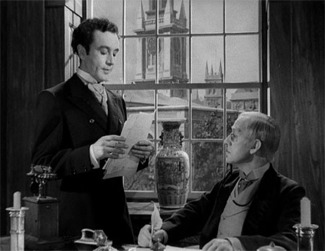
ASCOYNE. Would you say that he's sound?
LOUIS. ... I wouldn't say not, sir.
ASCOYNE. Hmm. Thank you ... Mazzini.
LOUIS. Yes, sir?
ASCOYNE. I've watched your progress here with great care and have been gratified to note that it has fully justified my judgement in inviting you into the firm. In view of that, and in order that you may be able to adopt a style of living befitting a member of the d'Ascoyne family, I have decided to appoint you my private secretary at a salary of £500 per annum.
LOUIS. Sir, I cannot begin to ...
ASCOYNE. Oh, please do not try. I had intended that my son should occupy the position.
LOUIS. I can only say that I will try to make my occupancy of it worthy of his memory.
I left the Hallwards' house and took a bachelor apartment in St James's. Clapham no longer held Sibella's presence to compensate me for the tedious journey between the suburbs and the city. Anyhow, it would be vastly more convenient for her to visit me here.
LOUIS. Now, let me have a look at the beautiful Mrs Holland. No, I think I prefer Miss Hallward.
SIBELLA. So do I. Louis, it's very wrong of me to visit you here.
LOUIS. Why?
SIBELLA. A married woman calling on a bachelor? ... a dangerous bachelor ...in his apartment.
LOUIS. I? Dangerous? These things only become wrong when people know about them. This is a very discreet apartment. That's why I chose it.
SIBELLA. So that young women could call on you with safety?
LOUIS. So that one young woman could.
SIBELLA. How did you know she'd want to?
LOUIS. I hoped. How did you enjoy your honeymoon?
SIBELLA. Not at all.
LOUIS. Not at all?
SIBELLA. Not at all.
LOUIS. And how was Italy?
SIBELLA. Oh, impossible! Every time I wanted to go shopping, Lionel dragged me off to a church or picture gallery. Said he wanted to improve his mind.
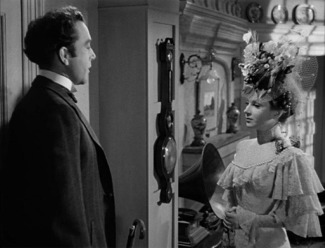
SIBELLA. I should reprove you for saying unkind things about him but I can't. Louis, I think I've married the most boring man in London.
LOUIS. In England.
SIBELLA. In Europe! Oh, the Italian men are so handsome, but I could never get away from Lionel for a moment. But I was forgetting - you're Italian.
LOUIS. Half.
SIBELLA. Louis ... I can speak frankly to you?
LOUIS. Well, if not to me, to whom?
SIBELLA. I shall go mad. Already when he touches me, I want to scream. [THEY KISS] What am I doing?
LOUIS. You know very well. You're playing with fire.
SIBELLA. At least it warms me. I must go. Lionel's dining at home tonight.
LOUIS. Where is Lionel dining tomorrow night?
SIBELLA. With some business acquaintances.
LOUIS. And where are you dining tomorrow night
SIBELLA. Here?
LOUIS. Here.
Poor little imprisoned bird. Well, she was welcome to come and flutter her wings with me. I could think of many more disagreeable ways of killing time, pending the arrival of the moment when the conventional decencies would permit me to make my declaration to Edith.
As to the other undertaking, I had not forgotten or forgiven the boredom of the sermon at young Henry's funeral, and I decided to promote the Reverend Lord Henry d'Ascoyne to next place on the list. I therefore assumed the garb and character of a colonial bishop spending his vacation making a collection of brass rubbings from country churches.
THE REVD HENRY. Good evening, my lord.
It was, for a moment, a shock to be addressed by my ecclesiastical title, but I recovered quickly.
LOUIS. Good evening. I was just taking a rubbing of this most interesting brass.
HENRY. An ancestress of my dear late wife. Allow me to introduce myself. Henry d'Ascoyne, rector of this parish.
LOUIS. Septimus Wilkinson, bishop of Matabeleland. I’m spending my vacation taking a cycling tour around your beautiful country churches.
HENRY. Ah! Have you noticed our clerestory?
LOUIS. Cle ... Ah, exquisite!
HENRY. The corbels are very fine.
LOUIS. Hmm.
HENRY. Perhaps Your Lordship would permit me to show you one or two other things in which we take a pride.
LOUIS. I should be most interested.
HENRY. Our most notable features, of course, are the d'Ascoyne memorials. Every member of the family, to a cadet branch of which I have the honour to belong, is buried here in the family vault. Here you will see the first duke and his duchess. The dead watching, as it were, over the living. The church is exceptionally endowed also with items of architectural interest. You will note that our chantry displays the crocketted and finialled ogee which marks it as very early Perpendicular. The bosses to the pendant are typical. And I always say that my west window has all the exuberance of Chaucer, without, happily, any of the concomitant crudities of his period.
LOUIS. Hmm.
HENRY. Now we approach the font ...
At last he did as I had hoped and invited me to dinner. The Reverend Lord Henry was not one of those newfangled parsons who carry the principles of their vocation uncomfortably into private life. However, he exhibited a polite interest in the progress of the Christian faith in Matabeleland which I was at some difficulty to satisfy.
LOUIS. The SPCK have provided us with a large number of copies of the good book translated into Matabele, but as none of the natives can read even their own language ...
HENRY. You speak Matabele yourself?
LOUIS. Not as a native.
HENRY. It would be most interesting to hear a sample of the language.
LOUIS. I'm afraid my Matabele is a little rusty.
HENRY. Oh, come, my lord. Daniel cast into the lions' den, for example.
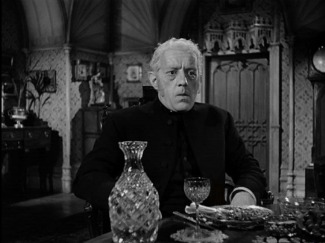
HENRY. Most interesting. My lord, the port is with you.
LOUIS. Oh.
HENRY. How do you find the wine?
LOUIS. Admirable.
HENRY. Cockburn '69.
LOUIS. Mm.
HENRY. No finer year, in my view. My doctor, though, is of a different opinion.
LOUIS. And what does he favour?
HENRY. Abstinence!
LOUIS. Ha ha.
HENRY. Would you care for a cigar?
LOUIS. Thank you. [HE PUTS A WHITE POWDER INTO THE DECANTER OF PORT]
HENRY. Yes, he's continually warning me about the state of my arteries ... but I say to him "What possible harm can there be in one glass of an evening, or even two?"
LOUIS. What harm, indeed.
HENRY. You do not condemn me then?
LOUIS. Not in the least.
HENRY. If I may say so without disrespect to my superiors, your visit has brought me something which I could not expect from any churchman in this country. [HE DIES. LOUIS POURS THE REST OF THE PORT INTO A FLOWER POT]
I surmised, correctly, as it proved that Lord Henry's doctor would assume that he had succumbed to a surfeit of port, and would politely ascribe death to a heart attack.
On my return to London, I decided to proceed methodically with the elimination of the remaining minor obstacles.
Lady Agatha d'Ascoyne was a pioneer in the campaign for women's suffrage. [SHE BREAKS THE WINDOWS OF AN ART GALLERY AND THE POLICE ARREST HER]. With the inconvenient consequence that her public appearances were invariably made under the watchful eyes of the Metropolitan Police. When she was not making public appearances, she was in prison and still more inaccessible. In fact, before I could learn of a favourable opportunity, I had to join the movement myself. Secret plans had been made for Lady Agatha to celebrate her latest release from Holloway by a shower of leaflets over Whitehall and the West End.
AGATHA. Anchor. [SHE TAKES OFF IN A BALLOON. LOUIS SHOOTS HER WITH A BOW AND ARROW]
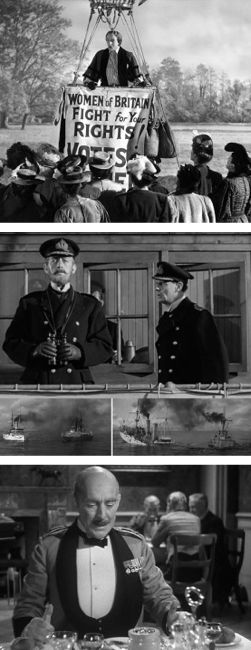
I shot an arrow in the air; she fell to earth in Berkeley Square.
Admiral Lord Horatio d'Ascoyne presented a more difficult problem. He scarcely ever set foot ashore, and I was beginning to feel that this task was beyond even my ingenuity when he was conveniently involved in a naval disaster which arose from a combination of natural obstinacy and a certain confusion of mind unfortunate in one of his rank.
HORATIO. Bring her to port.
OFFICER. Surely you mean starboard, sir.
HORATIO. Port!
Both ships sank almost immediately, though, fortunately, all hands were saved save one. Admiral Lord Horatio, obstinate to the last, insisted on going down with his ship.
General Lord Rufus d'Ascoyne, on the other hand, who never tired of demonstrating how he had fought the most calamitous campaign of the South African War, was a fairly easy proposition.
RUFUS. At that moment, the concealed enemy emerged from behind the kopje. I held our guns' fire until we could see the whites of their eyes. Then I gave the order. "Fire!" Boom, boom, boom.
It seemed appropriate that he who had lived amidst the cannon's roar should die explosively. I therefore concealed in a pot of caviar a simple but powerful homemade bomb and through the post, I sent the caviar to the general.
RUFUS. I pretended to be deceived by the feint and sent our horse to meet it. At that moment, the concealed enemy emerged from behind the kopje. I held our guns' fire till we could see the whites of their eyes. Used to get a lot of this stuff in the Crimea. One thing the Russkies do really well. [EXPLOSION]
LOUIS. Not an atom of him was left.
